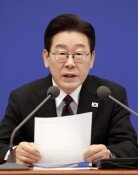Will President for United Europe Be Born?
Will President for United Europe Be Born?
Posted October. 11, 2002 23:03,
Will the EU have its own president when it is launched in earnest? So far, the EU has become a gigantic community having 25 countries as its members.
The question was first thrown by Schroeder. On October 9th, 2002, the German Chancellor publicly began to support the creation of the EU president. Ever since his remark, a heated debate has been continuing between powerful EU member countries and the rest of the members.
In his Oct. 9th meeting with EUs head Romano Prodi in Brussel, Belgium, he said, according to the Oct. 10th report of Financial Times, The current EU presidency, which rotates every six months between different member states, did not work. He could see merit in the plan, promoted by President Jacques Chirac of France and Tony Blair, the British prime minister, to give the council a full-time president if balancing powers were handed to the commission.
Even tough Schroeder assumed a presupposition by saying, I would support the plan if I am assured the new president of the EU council would not undermine Mr Prodi and his colleagues, small EU members are not enthusiastic about the proposal since they believe the big 3 of EU such as Britain, Germany and France are trying to dominate EU.
In a nutshell, the whole problem lies in the issue of how the status of EU Commission will be affected in the future. Smaller EU members, who believe their interests are best represented by a strong Commission, are opposing it vigorously, since they fear that some powerful EU countries are trying to belittle the commission. Even some member countries argue that the commission may be fallen into an agency serving the councils president.
Heads and foreign ministers of member countries compose the EU council, whose presidency rotates every six months between different member states. Each EU country has a different number of votes based on its population and national power. Thus, strong countries wield stronger power in the EU council. On the other hand, each state, regardless of its size or power, has the same voting power in the EU Commission, which consists of council members recommended by each EU member state and later approved by the EU council.
British Foreign Minister Jack Straw, in his contribution to the latest copy of The Economist, argued, The policy of EU lacks consistency. The president of Commission changes every six months. In addition, the Commission is losing efficiency since it respects the opinions of the member states too much. If a president is elected, he or she would serve for several years, overseeing delivery of the Union`s strategic agenda and communicating a sense of purpose to Europe`s citizens."
But Austrian Foreign Minister refuted the argument and said, The idea directly contradicts the principle of equality. The presidency will surely go to one of the powerful member states.
Thus, some point out that, even after the presidency is introduced, the EU council should be given the right to select the new president. That way, the legitimacy and legality of it can be strengthened and the principle of checks and balances will be kept.
havefun@donga.com







